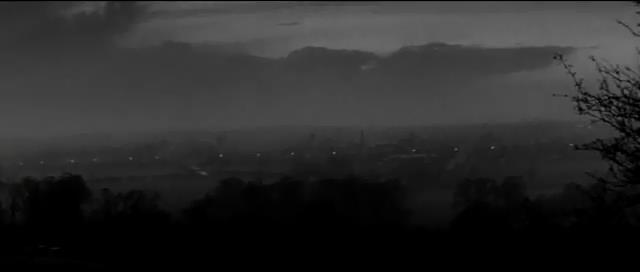Lost
The one about the rich baby stolen in London from an
American Embassy staffer and his Austrian wife.
C.I.D. have a field day with this, of course, in various ways.
So does Otto Preminger in Bunny Lake Is Missing (Tears for Simon is the American title).
The Snorkel
The illicit sojourner who enters the villa, drugs the inhabitant, seals
the room, turns on the gas, and sits quietly breathing air from outside through
the title apparatus, is played by Peter van Eyck.
Winner echoes the meticulous opening scene in The
Mechanic, the general theme in Scream for Help.
Cousteau & Malle’s Il mondo di silenzio is
advertised across the street from Hotel Concordia Europa in the Riviera town.
“Not greatly distinguished” (Richard W. Nason, New
York Times).
“Tenuous suspenser”, says Halliwell’s Film Guide,
“which outstays its welcome.”
Sea of Sand
Battles like San Pietro happened by the hundred, John Huston points
out, with all the cost and difficulty.
The Long Range Desert Group is depicted on a costly and difficult
mission at “a point on a map”. Navigation is tricky and has to be accurate over
five hundred miles of desert behind enemy lines.
There are various explorations of the characters, some are married,
some not, losses are sustained, forced sacrifices are endured stoically and
heroically, the small mission is a small success in the vast scheme of things
ahead of the Eighth Army’s push on El Alamein.
It renders commentary superfluous.
The Angry Silence
Reviewers (Bosley Crowther, Variety, Halliwell’s Film Guide, Time Out Film Guide) do not mention Kazan’s On the Waterfront, which is an unfortunate
omission. Halliwell cannot resist one joke, “a po-faced I’m All Right Jack,” and sets up another tacitly
implying Look Back in Anger for what he calls the “domestic
scenes.”
Oddly enough, Lang’s or Losey’s M
is suggested by the lone worker whom management and union alike have no use
for.
It’s a local problem, London can’t stomach what the men of Melsham get
up to, when it comes to light, and that’s the title broken by events in a game
of labor relations one man stands up against on the merest obvious principle,
“an Englishman’s home is his castle,” as Crowther points out in his New York Times review.
“The Lone Striker”, Frost would say, gone to Coventry and hell, has a
couple of kids fond of Tex Ritter, so there you are, a Boetticher Western
filmed in Ipswich.
The Mark

The absolute position is Robbe-Grillet’s Le Voyeur, a relative position is Nabokov’s
Lolita (dir. Kubrick or Lyne), which points up the true entire structure of Green’s
film.
The widow is Swiss, her young daughter
English, the new man at the Northern firm is Canadian.
Cf.
The
Angry Silence
for the theme from Fritz Lang considered in the abstract as well as clinically,
it is to be noted that the surface mirror of the action is satisfactorily expressed
in its own right.
Score by Richard Rodney Bennett with an inspired theme, cinematography
Douglas Slocombe, camera Chick Waterson.
A.H. Weiler of the New York Times took it at face value faute de mieux, “largely placid, but poignantly
meaningful”. TV Guide, “poignant story”. Halliwell’s Film Guide, “worthy but evasive”, citing
the Monthly
Film Bulletin,
“no hint of the truly soulful is allowed to seep through.”
Diamond Head
The college girl and the kanakas, the tidal wave and the Chinese
mistress, an heir to the throne achieved at last, under the auspices of
Statehood.
The New York Times reviewer found this “standard
and obvious”, Variety “heavyhanded”, both saw
plantation politics (Halliwell’s
Film Guide,
“predictable”).
A Patch of Blue
A girl who can’t see, with reference both to Richardson’s a taste of honey and Hitchcock’s Marnie.
She has to be tended, she has to be cared for, she has to be sent to
blind school.
For Variety, “a touching contemporary
melodrama”. Pat Graham’s remark in the Chicago Reader (“directed with eyes on the noble Kleenex box”) is a notable
piece of idiocy. “Dated,” says Time
Out Film Guide,
“but not too sentimental”.
Halliwell’s
Film Guide
simply has “polished tearjerker”.
The poor ignorant girl protests her worldliness, she’s been “done
over”, she says in passing.
The Magus
The non-reality of a non-poet in the literary lists has to be
represented, thus answering Variety’s objection to certain stylistic
encumbrances.
The smile of antiquity is the great discovery, and the gradus ad Parnassum.
If it meant nothing, critically speaking, well, so much has meant
nothing over the years.
A Walk in the Spring Rain
A drama of middle age, of the generations, cast serendipitously in the
guise of a Foghorn Leghorn cartoon with Anthony Quinn in the lead, Ingrid
Bergman as the hen, Fritz Weaver as the dog, Tom Fielding as the young chicken
hawk, and Katherine Crawford as a young pullet (Virginia Gregg is Mrs. Leghorn,
religious, solitary).
Variety nixed this, Tom Milne (Time Out Film Guide) pronounced it “a dish of tripe”,
Halliwell “lacking in surprise” (his guide quotes Richard Roud, “not one line
or scene is believably written or acted”).
Luther
The sublimity of the presentation is entirely due to its reduction for
the screen, preserving the play’s technique, the Knight addresses the camera,
Tetzel sells indulgences to the theater.
Anhalt finds in the play Christ nothing but in men, the Church nowhere.
Beautiful performances and technique, nowhere appreciated by the
critics.
Pichel’s Martin Luther is certainly a precedent, also probably Eliot’s play Murder in the Cathedral for the scenic impressions.